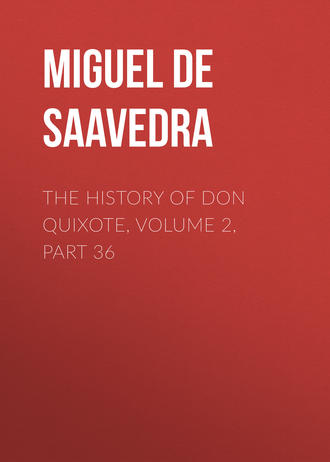
Мигель де Сервантес Сааведра
The History of Don Quixote, Volume 2, Part 36
Roque Guinart found his squires at the place to which he had ordered them, and Don Quixote on Rocinante in the midst of them delivering a harangue to them in which he urged them to give up a mode of life so full of peril, as well to the soul as to the body; but as most of them were Gascons, rough lawless fellows, his speech did not make much impression on them. Roque on coming up asked Sancho if his men had returned and restored to him the treasures and jewels they had stripped off Dapple. Sancho said they had, but that three kerchiefs that were worth three cities were missing.
"What are you talking about, man?" said one of the bystanders; "I have got them, and they are not worth three reals."
"That is true," said Don Quixote; "but my squire values them at the rate he says, as having been given me by the person who gave them."
Roque Guinart ordered them to be restored at once; and making his men fall in in line he directed all the clothing, jewellery, and money that they had taken since the last distribution to be produced; and making a hasty valuation, and reducing what could not be divided into money, he made shares for the whole band so equitably and carefully, that in no case did he exceed or fall short of strict distributive justice.
When this had been done, and all left satisfied, Roque observed to Don Quixote, "If this scrupulous exactness were not observed with these fellows there would be no living with them."
Upon this Sancho remarked, "From what I have seen here, justice is such a good thing that there is no doing without it, even among the thieves themselves."
One of the squires heard this, and raising the butt-end of his harquebuss would no doubt have broken Sancho's head with it had not Roque Guinart called out to him to hold his hand. Sancho was frightened out of his wits, and vowed not to open his lips so long as he was in the company of these people.
At this instant one or two of those squires who were posted as sentinels on the roads, to watch who came along them and report what passed to their chief, came up and said, "Senor, there is a great troop of people not far off coming along the road to Barcelona."
To which Roque replied, "Hast thou made out whether they are of the sort that are after us, or of the sort we are after?"
"The sort we are after," said the squire.
"Well then, away with you all," said Roque, "and bring them here to me at once without letting one of them escape."
They obeyed, and Don Quixote, Sancho, and Roque, left by themselves, waited to see what the squires brought, and while they were waiting Roque said to Don Quixote, "It must seem a strange sort of life to Senor Don Quixote, this of ours, strange adventures, strange incidents, and all full of danger; and I do not wonder that it should seem so, for in truth I must own there is no mode of life more restless or anxious than ours. What led me into it was a certain thirst for vengeance, which is strong enough to disturb the quietest hearts. I am by nature tender-hearted and kindly, but, as I said, the desire to revenge myself for a wrong that was done me so overturns all my better impulses that I keep on in this way of life in spite of what conscience tells me; and as one depth calls to another, and one sin to another sin, revenges have linked themselves together, and I have taken upon myself not only my own but those of others: it pleases God, however, that, though I see myself in this maze of entanglements, I do not lose all hope of escaping from it and reaching a safe port."
Don Quixote was amazed to hear Roque utter such excellent and just sentiments, for he did not think that among those who followed such trades as robbing, murdering, and waylaying, there could be anyone capable of a virtuous thought, and he said in reply, "Senor Roque, the beginning of health lies in knowing the disease and in the sick man's willingness to take the medicines which the physician prescribes; you are sick, you know what ails you, and heaven, or more properly speaking God, who is our physician, will administer medicines that will cure you, and cure gradually, and not of a sudden or by a miracle; besides, sinners of discernment are nearer amendment than those who are fools; and as your worship has shown good sense in your remarks, all you have to do is to keep up a good heart and trust that the weakness of your conscience will be strengthened. And if you have any desire to shorten the journey and put yourself easily in the way of salvation, come with me, and I will show you how to become a knight-errant, a calling wherein so many hardships and mishaps are encountered that if they be taken as penances they will lodge you in heaven in a trice."
Roque laughed at Don Quixote's exhortation, and changing the conversation he related the tragic affair of Claudia Jeronima, at which Sancho was extremely grieved; for he had not found the young woman's beauty, boldness, and spirit at all amiss.







